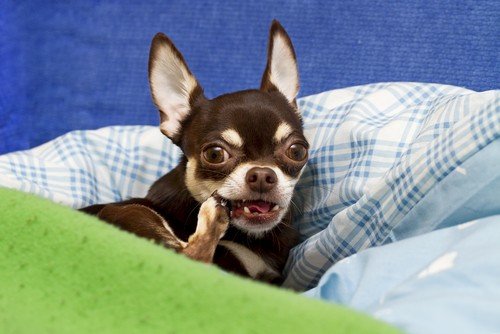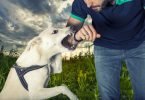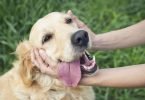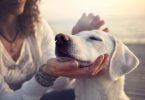Dogs engage in multiple strange behaviors, which can sometimes concern their owners. It comes as no surprise that your dog chewing paws worries you, and you want to know more about why your dog is doing it. There are many reasons why your dog may be chewing its paws.
If you want a detailed guide on how you can stop the paw chewing behavior, check out the article How to stop dog chewing paws: A guide to a paw-friendly atmosphere for more information on that topic. You will learn in detail how to go about the treatments and tips to stop this damaging behavior.
Allergies and discomfort are the two main reasons why your dog might be chewing on its paws. Inspect the legs for any signs of fleas, parasites, or cuts and abrasions. You can get your vet to check the paws out and get expert advice on how to proceed with the treatment.
Continue reading this article to find out more about your dog chewing paws behavior, and why the dog won’t stop chewing paws.
Is dog licking and chewing paws a normal behavior?
It is not unusual for dogs to lick themselves because that is how dogs clean themselves. But if this dog licking and chewing paws become excessive and constant, a dog owner may want to check out why the dog is behaving that way.
There are some reasons for dog chewing paws, which a dog owner can identify even without the help of a vet or experts, like flea or tick infestation, and cuts or scratches on its paws. However, some causes of dog chewing paws behavior are not visible, and dog owners will notice that the dog won’t stop chewing paws even if there are no parasites or cuts on its pads.
Why a dog keeps chewing paws
As mentioned earlier, it is normal for dogs to chew and lick themselves sometimes. The problem arises when the dop keeps chewing paws and does not stop. The following are some reasons to the question, “Why does my dog keep chewing its paws?”
Allergies
Being dogs does not mean that they are immune to all kinds of allergies. The main allergies which might trigger dog chewing paws behavior are:
Environmental allergies
Dogs can be allergic to several environmental factors such as pollen, dust mites, spores of mold, and animal dander. Some common signs of environmental allergies are inflamed skin and itchiness. These are symptoms of Atopy in dogs. If a dog has Atopic Dermatitis, you can see a change in their behavior; dog chewing paws raw is a typical reaction to find relief.
The dog chewing paws remedy for Atopy is anti-itch shampoos and controlling of environmental allergens by using air purifiers to control residential pollution. If the Dermatitis condition is on the more severe side, the dog may need the help of prescribed antibiotics to get rid of the problem.
Food allergies
Some dogs have food allergies, which may cause skin irritation and lead to a dog chewing paws raw. Many dogs get allergic reactions to beef, chicken, dairy, corn, and gluten. Out of these foods, several people consider corn and gluten as filler food, and these two are the leading causes of skin-related allergies in dogs.
If a dog is allergic to these filler foods, it may get itches and skin irritations. The dog chewing paws in an attempt to get rid of the discomfort caused by the food allergy is standard behavior. A dog owner can try to find out what food is causing the allergies and get rid of it entirely from the dog’s diet.
Flea allergies
All dogs will naturally scratch and chew on a flea bite. However, some dogs get severe allergies because of flea bites. Even the dead bodies or excrement of a flea might cause severe allergic reactions in a few dogs. This allergy will cause extreme discomfort and make the dog chewing paws bleeding.
The only way to get rid of a dog’s flea allergy is to get rid of all the fleas. This process might take a lot of time, but the results will be worth the effort. To reduce the discomfort of flea bites on a dog, consult a vet, and treat it with the proper medication.
Cleaning product allergies
A dog’s paws are almost always in contact with the floor. A dog owner may mop the floors with a cleaning product to which their dog might be allergic. A dog may get allergic reactions to bleach, some oven cleaners, lawn fertilizers, and drain cleaners with sulphuric acid.
If your dog chewing paws does not stop even after getting rid of all fleas, food allergens, and environmental allergens, cleaning product allergies are likely to be the culprit. Try switching the cleaning products to see if there is any difference.
Fear and age-related anxiety
Anxiety in dogs is a frequent occurrence and a problem that many dog owners face. If you have concerns like, “my dog keeps chewing his paws even after we got rid of all possible allergens,” your dog chewing paws might be because of fear and age-related anxiety.
Fear-related anxiety
It is perfectly normal for a dog to feel scared in certain situations, but constant fear and anxiety may be a sign of abnormal behavior. Extreme stress out of fear may hurt a dog’s health. A dog may start to bark incessantly and also chew on its paws as a result of this anxiety.
The dog chewing paws remedy for fear anxiety is to discourage the behavior with exercises and activities which an animal expert or vet advises.
When a dog licks itself far too often, it can cause lick granulomas, which get worse and bigger every time they lick the wound. To avoid further problems, dog owners must get to the bottom of their dog’s fear and anxiety problems.
Age-related anxiety
Sometimes a dog chewing and licking paws may be because of age-related anxiety problems. Although this occurrence is not very common, a dog owner can control it with the help of a vet or animal behavior expert. After a dog grows old, its ability to learn, react, and think, slows down. As a result, they become more anxious about their environment.
Some other signs that show age-related anxiety are panting, barking, whining, loss of control over urination and defecation, and aggression. A dog’s memory also declines as it grows older.
Dry skin
We, humans, have moisturizers to take care of dry skin, but dogs do not have such luxuries. The only way they can get rid of dry skin is to lick on it. If the case of dry skin is very severe, it causes the dog chewing paws bleeding.
The causes of dry skin in dogs are as follows:
- Allergies to food, fleas, environmental allergens, and cleaning products
- Parasites like lice, fleas, and canine scabies
- Infection like ringworm
- Too much bathes for the dog using strong shampoos which are not safe for the skin if used too frequently
- Poor nutrition
Dog chewing paws treatment for dry skin is.
- Make sure that your dog avoids allergens
- Getting your dog allergy shots under the supervision and prescription of a vet
- Make sure your dog gets a healthy and balanced diet from the start
- Use skin-friendly cleaning products like mild shampoos for your dog
- Stop parasites from making a host out of your dog’s body
One of the best products to keep your dog’s paws moisturized and free from dry skin is Burt’s Bees Dog Lotion. This lotion for dogs contains a mix of olive oil and rosemary, which is soothing and gentle to the skin. It is suitable for both adult dogs and puppies alike. Musher’s Secret is another useful product that protects the paws of a dog from hot and cold surfaces. It also protects the paws from salt.
Dog chewing paws out of boredom
It is a fact that dogs lick themselves as a coping method for anxiety and stress. When a dog is feeling bored and has nothing to do, they may start licking or chewing their paws to keep themselves occupied and to relieve the stress that comes with boredom.
There a few breeds of dogs that lie on the intelligent end of the scale like german shepherds, golden retrievers, and poodles. These intelligent dog breeds require a lot of mental and physical stimulation to prevent boredom. Since the consequences of boredom may lead to the dog owner losing a few valuable items to chewing, the prevention of boredom is necessary.
You can help to keep your dog stimulated and occupied by exposing it to new environments and experiences, and physical exercise. Exploring new things and solving puzzles can also help in keeping a dog out of the boredom zone.
A dog may get tired of the same old dog toy. Therefore, if possible, dog owners should try to rotate between dog toys and allow it to stay distracted, happy, and healthy. Giving the dog a new playmate is also very useful in keeping the dog absorbed in an activity and stop it from chewing its paws.
One thing to keep in mind while choosing a dog toy is to make sure that the toy is not easily breakable or tearable. Swallowing parts of a dog toy will have dire consequences on the health of the dog. Instead of solving the problem of dog chewing paws, it will create more issues related to their health and well-being.
The existence of parasites
Some of the common parasites which a dog might be hosting are fleas, ticks, and mites. If a dog has external parasites on its body, it will chew the part of the body which the parasite bites. Why does a dog chewing paws have anything to do with parasites? Well, these parasites can creep into the crevices or surface of the dog’s paws.
In an attempt to get rid of the parasite, a dog may start chewing its paws. If the dog successfully removes the parasite, it might keep chewing to relieve the itch caused by the parasite’s bite.
Although dogs that live in rural areas or places close to wildlife have a comparatively more significant number of external parasites, even dogs living in cities or residential neighborhoods can get them. The ways through which external parasites get spread are:
- By being in contact with an infected dog
- Fleas can jump into a house through doors and windows
- Fleas and ticks can hang on to a person’s pants and get passed to their dog
- Ticks stick on dogs when they move through tall grass
Ticks and fleas are visible even to the naked eye, and a dog owner can quickly get rid of the problem after identifying it. The problem with mites is that they are visible only under a microscope. If your question is, “why does my dog keep chewing his paws even if there are no fleas or ticks on it?” the answer might be the presence of mites.
Dog chewing paws because of pain
A dog has its paws in contact with the ground almost every minute of the day. The floor that we collectively walk on may have sharp objects like glass, thorns, and shards of broken furniture or other equipment. We, humans, have shoes and other footwear which protects our feet from these objects, but dogs do not wear shoes. Sometimes, the open paws of a dog and the ground do not go so well together.
If a dog injures, pierces, or cuts its paws from the objects on the ground, they will chew or lick the wound in an attempt to find relief. A dog may chew its legs to get rid of the foreign object in their paws, or it may chew or lick on the cut to relieve the pain. A dog owner should examine a dog’s paws in search for cuts and scratches so that they can take care of it on time to avoid infections.
Canine Hip Dysplasia or arthritis
Both Canine Hip Dysplasia and arthritis are bone and joint-related problems that dogs may contract. Dogs with either of these two conditions may chew on the affected parts to get relief from the pain and discomfort they both cause.
Hip Dysplasia is when the ball and socket of the joint do not develop properly and leads to difficulty in sliding. The bone and socket of a dog with Hip Dysplasia will grind and rub against each other instead of moving smoothly.
On the other hand, Osteoarthritis or arthritis, also known as Degenerative Joint Disease, is when the cartilage in joints start to deteriorate, and the joint begins to swell. Osteoarthritis causes a significant decrease in range of motion and extreme discomfort along with pain.
The dog chewing paws treatment for these two problems is physical therapy and anti-inflammatory medications. In this particular case, a dog owner will compulsorily need the advice and prescription of a vet or expert.
Chewing and licking paws to groom itself
Dogs may sometimes lick themselves or chew on their paws to groom themselves or clean themselves. If there is dirt or some other foreign object on its legs, the dog will chew and lick the paw until they can remove it.
Treatments to stop a dog chewing paws
To stop a dog from chewing its paws, a dog owner can check out the following steps and tips:
- Soak the dog’s paws in any disinfecting liquid like vinegar or iodine
- Use honey or coconut oil to moisturize the paws of the dog so that it does not chew due to dry skin
- Use anti-chewing products like paw mittens and dog chewing deterrent
Some of the best dog chewing deterrent products available on the online shopping website Amazon are:
Grannicks Taste Deterrent Spray
This taste deterrent by Grannick has a bitter apple flavor that stops puppies and dogs from chewing their paws. Just apply it to the surface of anything you do not want the dog to bite, and it will work like a charm. The spray leaves no stain on furniture or skin after use. It is perfectly safe and non-toxic.
No Chew Spray Deterrent
Another effective spray that will help a dog owner to stop their dog from chewing everything, including their paws, is the PetsVV Anti-Chew Spray for dogs. This product is an all-natural product with tea tree oil to soothe hot spots.
Emmy’s Best Stop the Chew
This dog chewing deterrent is strong, safe, and has an alcohol free formula. The convenient spray nozzle makes it extremely easy to use and leaves no mess in the process. It is an effective product that will help you to teach your dog not to chew.
A DIY recipe for making dog chewing deterrent
Is your dog still chewing its paws, and are you starting to wonder, “why my dog keeps chewing his paws even after I put manufactured dog chewing deterrents on its legs?” You can make your very own dog chewing deterrent using this easy recipe:
- You can make a non-toxic dog chew deterrent using a concoction apple cider vinegar and white vinegar. The composition will be two parts of apple cider vinegar and one part white vinegar.
- Dogs do not like the smell of citrus fruits. You can use this to your advantage and make a safe dog chew deterrent using lemons, limes, and oranges, and substituting lemon for apple cider vinegar is also a beneficial dog chew deterrent recipe.
- Citrus and vinegar chew deterrents are not effective on some dogs. For such cases, adding a little bit of cayenne pepper to water will teach your puppy not to chew.
The DO’s and DON’Ts of teaching your dog not to chew its paws and other things
The remedy to stop your dog chewing paws will differ according to different reasons regarding why it is chewing its paws in the first place. However, there are some general rules as to what you should do and what you should not do. They are:
The DO’s
Give your dog chew substitutes
As discussed earlier, sometimes, a dog may chew its paws because of anxiety or fear. In such cases, it starts to bite and chew on everything, including their paws and tails. If a vet or an expert confirms that anxiety is triggering the paw chewing behavior, a dog owner should provide the dog or puppy with a chew toy so that it can chew the toy instead of its paws or furniture. Just make sure that the toy does not have loose or brittle parts that the dog might swallow.
Make use of deterrent sprays
Using alcohol-free and non-toxic deterrent sprays on the pieces of furniture or paws will help to teach your dog not to chew on things. Even if the dog does not chew on something valuable, it is necessary to control this behavior to avoid future complications relating to discipline and dental care.
Take your dog out on walks and let it partake in other physical activities
Giving your dog the exercise that it needs, both mentally and physically, will help a lot to reduce the paw chewing behavior due to boredom.
The DON’Ts
Punishing the dog
You should never punish a dog after it finishes chewing on its paws or furniture or shoe. The dog will associate what it is currently doing to your punishment and continue gnawing, but not the other activity. You can discipline it only during the act of chewing.
Do not allow the dog to chew on you
Although puppy may not hurt you even if it chews on you, you should never teach or allow it to gnaw or nibble your hands or feet. This warning is because once the puppy grows into an adult dog, its nibbles will turn into bites and may hurt you.






